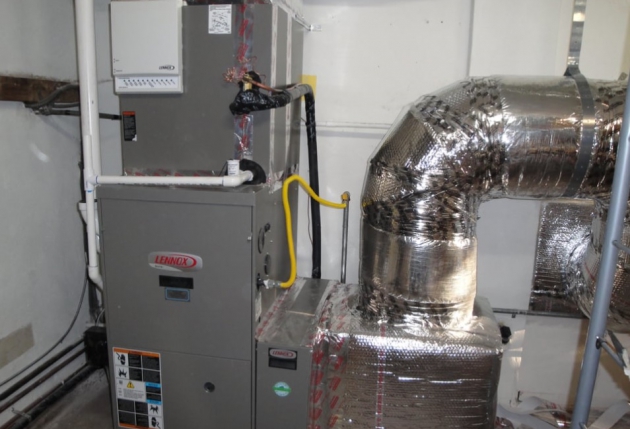Heating and cooling experts agree that a properly installed and well maintained HVAC system could last between 12-17 years. If you want your HVAC system to be at the upper end of that scale, it makes sense to protect your investment with regular maintenance. Well maintained heating and cooling equipment is more energy efficient, and this can lead to significant energy savings over the lifespan of the system. In this article, we will show five ways that you can extend the useful lifespan of your HVAC system.
- Regular Maintenance Twice Each Year
Ideally, an HVAC system should be tuned-up twice each year. This should occur during spring and fall to get the systems ready for peak operating periods in summer and winter. A modern and efficient HVAC system is very high maintenance, but you still need to invest in maintenance at least once per year. Over time any system will lose efficiency, and the various components must be inspected, cleaned, and adjusted regularly. If your local HVAC technician discovers a minor issue, they can fix it for you and help you to avoid a larger repair bill later. An HVAC system is complex; it has electrical, electronic, and moving mechanical parts. We all get our cars serviced to protect our investment, and an HVAC system deserves the same attention.
- Correct HVAC System Sizing
The HVAC system in your home must be carefully matched to the correct size. The only accurate way to achieve this is to have a technician carry out a professional load calculation. There are free online tools to perform a load calculation, but they are purely based on the square footage, and they don’t take other factors into account. An accurate local calculation involves many other parameters, including the home orientation, the number of windows, insulation levels, airflow patterns, and many others.
If the HVAC system is incorrectly sized for the home, it can lead to a number of problems.
If the HVAC system is too small, it may run constantly as it attempts to treat the air in the home. It can never achieve this, and as a result, the energy bills will spiral out of control quickly. This also causes the equipment to be overworked, leading to an unexpected repair or a premature failure.
If the HVAC system is too large, the temperature set on the thermostat will be reached too quickly. This may seem like a good thing, but it isn’t, and it leads to a phenomenon known as “short cycling.” This is when the HVAC system turns on and off again in quick succession because it heats or cools the home rapidly. This can introduce additional moisture into the home leading to mold and mildew issues. Again, this will add strain to the system leading to reliability issues and shortened lifespan.
- Change the Air Filter Regularly
When you get a regular service with a local HVAC technician, they will check the air filters. But, this will only occur once or better twice per year, and an air filter should be checked at least once per month. This means that you will need to inspect and change or clean your air filters yourself. Don’t worry; the full details on the procedure are outlined in your owner’s manual, and if you’ve misplaced it, you can get a pdf replacement online.
It’s important to fit the right size of filter, and this is usually printed on the filter and detailed in the manual. If the filter is too small, the air will go around it, and if it is too large, it will not fit. If you’re using a fiberglass air filter, it should be replaced every 30 days, and a pleated filter should last 90 days. If you have pets, you may want to replace or clean your filters more often.
Filter replacement is vital because it protects the components in your HVAC system against damage. If the air filter becomes too clogged, the airflow is impeded, and this can cause your system to work harder to compensate. Overworked heating and cooling equipment is prone to failure, and the chances of an earlier failure are more likely. It’s easy to help your HVAC system to breathe with regular filter changes, and this can solve many reliability issues.
- Don’t Overwork Your HVAC System
We’ve covered overworking the HVAC system in a few specific cases. But, generally, using the system in a hard way will certainly introduce a great deal of stress. When you set your thermostat, try to be realistic. If the external temperature is 100º, it’s not a great idea to set your indoor temperature at 69º. This will cause your system to work hard for a longer period of time, and this will affect your system negatively. The best way to adjust and monitor your HVAC system is to install a smart thermostat. This will give you feedback in real time and allow you to adjust your settings on the fly.
- Switch to the “Auto” Fan Setting
Most HVAC systems have a pair of fan settings to select; they are “On” and “Auto”. The “On” setting instructs the system to run the fan constantly, and the “Auto” setting runs the fan only when the HVAC system is actively heating or cooling the home. Some systems have dual speed fan that can provide a slow and energy efficient setting that’s perfect between the heating and cooling cycles. The “On” setting is not a good option for consistent use, but it does have certain advantages when it comes to keeping your home free from dust and dirt. This is great for allergy sufferers at certain times of the year, but it does cause the system to work harder. Over time this will lower the useful lifespan considerably, and the “Auto” setting is a better option.
Contact your local HVAC specialist and ask them about a maintenance program to keep your system working efficiently and protect your investment.

